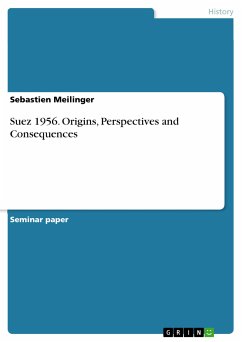Seminar paper from the year 2014 in the subject History of Europe - Europe in the Cold War, grade: 1,0 (A), Diplomatic Academy of Vienna - School of International Studies (Universität Wien), course: Perspectives in World History, language: English, abstract: The Suez Crisis has been studied from many different perspectives and has become a synonym for a watershed moment of post-war history. The ongoing turbulences in many parts of the Middle East are characterized by excessive violence, sectarian divides, ethnic cleansing and political instability. Many of those conflicts can be linked to the foundation of the State of Israel in 1948, as not all parties were provided with a satisfying solution. More over the Sykes Picot Agreement set the basis for an instable region and planted the seeds for many conflicts to come. In this timeline besides the Israeli War of Independence there are many milestones exhibiting different crises and wars such as the Six Day War or the Yom Kippur War. This long line of conflicts is not limited to Israeli-Arab wars but also includes for instance the reinstitution of the Shah or the most recent ongoing tragedy which is the Syrian Civil War. The 1956 Suez Crisis can be ranged along this long line of events however with the crucial difference that its significance and repercussions are not limited to the Middle East. In this seminar paper it will be attempted to explain how this turning point of history came about and to what extent it was necessary or evitable. The consequences of the Suez Crisis will be discussed from individual countries perspectives and also its significance on a systemic level. In the first section the various factors leading up to the Suez Crisis will be analysed, followed by an assessment of the different motives of the participating countries. The third section will inquire how the Suez Crisis affected the British, French, Israeli and American course and how the overall significance of Suez played out in the long run.
Dieser Download kann aus rechtlichen Gründen nur mit Rechnungsadresse in A, B, BG, CY, CZ, D, DK, EW, E, FIN, F, GR, HR, H, IRL, I, LT, L, LR, M, NL, PL, P, R, S, SLO, SK ausgeliefert werden.









